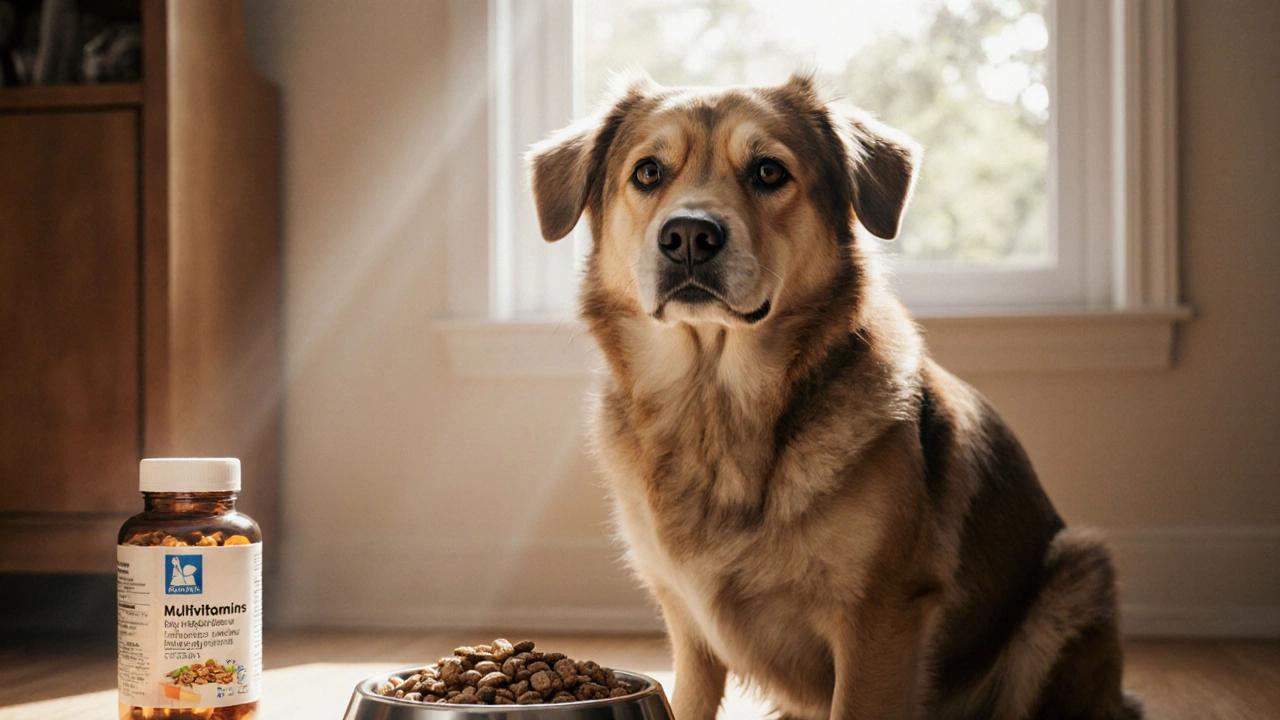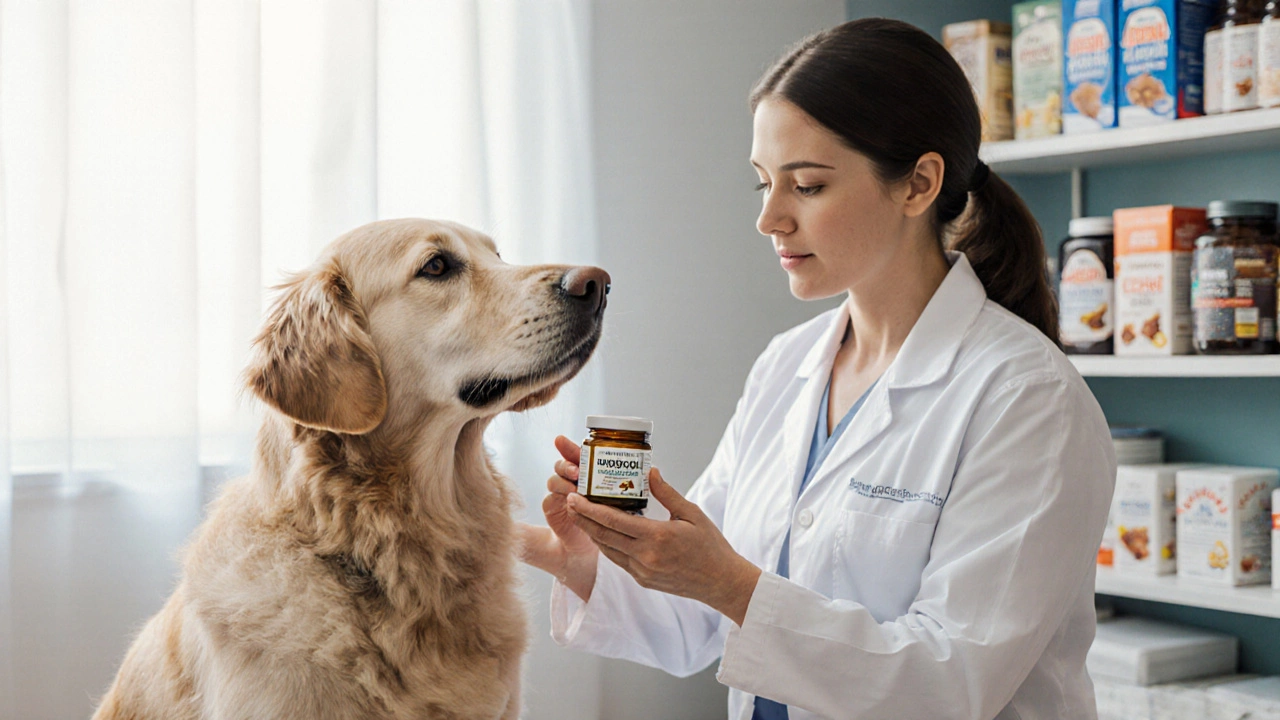Dog Supplements – Why Your Dog Might Need Them
Many owners think good food is enough, but a dog’s diet can miss key nutrients, especially as they age or have health issues. Adding the right supplement can fill those gaps, keep joints moving, coat glossy, and digestion smooth. The goal isn’t to replace meals, but to support what food alone can’t provide.
Common Types of Dog Supplements
Joint support: Glucosamine, chondroitin, and MSM are the usual suspects. They help cartilage stay flexible and reduce stiffness in older dogs or large breeds.
Skin & coat boosters: Omega‑3 fatty acids from fish oil or flaxseed add shine and calm itching. They’re also good for heart health.
Digestive aids: Probiotics and prebiotic fibers balance gut bacteria, which can improve stool quality and immunity.
Multivitamins: A broad blend of vitamins A, D, E, and B‑complex can patch minor deficiencies, especially in puppies on homemade diets.
Calming formulas: L‑theanine, valerian root, or low‑dose melatonin help dogs with anxiety, travel stress, or thunder fright.
How to Pick Safe, Effective Supplements
First, check the label for a clear list of ingredients and the exact amounts per serving. Vague terms like “herbal blend” or “proprietary formula” often hide low‑quality fillers.
Second, look for a UK‑based manufacturer that follows VMD standards or has a third‑party test report. Independent labs verify purity and potency, which reduces the risk of contaminants.
Third, match the supplement to your dog’s size, age, and health condition. A two‑year‑old terrier needs far less glucosamine than a ten‑year‑old Labrador.
Fourth, start with the lowest recommended dose and watch for changes in energy, appetite, or stool. If anything seems off, pause and contact your vet.
Finally, buy from a reputable retailer that offers easy returns and clear customer service. Stores that specialize in pet health, like Comet’s Pet Shopping Haven, often have vet‑approved selections and detailed product pages.
Using these steps, you can choose a supplement that truly supports your dog’s well‑being without risking side effects.
Remember, supplements work best when paired with a balanced diet, regular exercise, and routine vet check‑ups. They’re a tool, not a miracle cure.
Ready to give your pup an extra health boost? Browse the top‑rated joint, coat, and digestive supplements on our site, read real user reviews, and find the perfect match for your furry friend.
Posted By Bryndle Redding On 18 Nov 2025 Comments (0)
How to Know What Vitamins Your Dog Really Needs
Most dogs don't need extra vitamins if they eat balanced food. Learn when your dog actually needs supplements, what signs to watch for, and how to avoid dangerous mistakes with dog vitamins.
READ MOREPosted By Bryndle Redding On 16 Nov 2025 Comments (0)
Do Vets Recommend Coconut Oil for Dogs? Real Advice from Veterinarians
Vets rarely recommend coconut oil for dogs because there's little scientific proof it helps - and real risks like pancreatitis and weight gain. Learn what actually works for skin, coat, and digestion instead.
READ MOREPosted By Bryndle Redding On 10 Jun 2025 Comments (0)
Supplements for Homemade Dog Food: What Your Pup Really Needs
Balancing homemade dog food isn't as easy as tossing together chicken and rice. Dogs have specific nutritional needs that aren't always met with regular human food, so picking the right supplements is critical. Whether you're cooking for a picky eater or trying to avoid common allergens, certain vitamins and minerals can make a major difference in your pup's health. This article breaks down the must-have supplements, explains why they're needed, and shows you how to use them safely. It's written for anyone who wants to keep their dog's homemade meals both tasty and healthy.
READ MOREPosted By Bryndle Redding On 17 May 2025 Comments (0)
Do Vets Recommend Supplements? Dog Health Tips You Need to Know
Discover whether veterinarians really recommend supplements for dogs or if it's all hype. This article breaks down what vets look for, common misconceptions, and which supplements are actually worth it. You'll learn how to tell the difference between what your dog really needs and what's just clever marketing. Get practical vet-backed tips on choosing safe supplements. Make informed choices for your dog's health with real-world advice.
READ MOREPosted By Bryndle Redding On 28 Apr 2025 Comments (0)
Do Vets Recommend Canine Prime? Honest Answers for Dog Owners
Ever wondered if vets really trust Canine Prime for boosting your dog's health? This article digs into what vets say, what's actually in the supplement, and whether it's worth your money. We'll also break down real-world results from other dog parents and help you decide if Canine Prime fits your pup's needs. Expect practical advice, clear facts, and tips that make sense for everyday dog owners. No fluff—just real talk about canine health.
READ MOREPosted By Bryndle Redding On 15 Mar 2025 Comments (0)
Best Fruits for Dogs: Keeping Your Canine Healthy and Happy
Dogs can enjoy fruits, providing vital nutrients and benefits for their health. Common fruits like apples, blueberries, and bananas offer vitamins and antioxidants, enhancing their diet. However, not all fruits are safe, so it's crucial to know which ones to avoid. Choose wisely to make your furry friend's snack time both tasty and nutritious. Incorporating fruit into your dog's diet can be a fun and healthy supplement when done right.
READ MOREPosted By Bryndle Redding On 11 Mar 2025 Comments (0)
Symptoms of B12 Deficiency in Dogs: What to Watch For
B12 deficiency can impact a dog’s health significantly, affecting their energy, appetite, and overall wellbeing. This article dives into the telltale signs that your furry friend might be lacking this vital nutrient. From fatigue to digestive issues, understanding these symptoms can help you seek timely medical advice. Learn practical tips on how to boost B12 levels through diet and supplements. Your dog's health can see great improvements with the right knowledge and action.
READ MOREPosted By Bryndle Redding On 17 Feb 2025 Comments (0)
Most Common Vitamin Deficiency in Dogs: What You Need to Know
Vitamin deficiencies in dogs can cause a variety of health issues, the most common being Vitamin D deficiency. Dogs rely on their diet to get sufficient vitamins, making it crucial to choose the right foods or supplements. A well-balanced dog diet can prevent these deficiencies. This article explains the causes, symptoms, and solutions to the most common vitamin deficiencies in dogs.
READ MOREPosted By Bryndle Redding On 14 Dec 2024 Comments (0)
Is Cheese Safe and Beneficial for Your Dog's Health?
Cheese, a favorite treat for many pet owners, brings up the question of whether it's safe or beneficial for our dogs. Although cheese can be a source of protein and calcium for dogs, it's not always a one-size-fits-all food. Some dogs may enjoy it without issues while others might be lactose intolerant. This article explores the benefits, risks, and tips for incorporating cheese into your dog's diet.
READ MOREPosted By Bryndle Redding On 27 Nov 2024 Comments (0)
Exploring the Value of Dog Health Supplements
Dog health supplements have become a popular choice for pet owners looking to enhance their furry friend's well-being. These products promise to address various issues ranging from joint problems to coat health. But are they genuinely beneficial, or just another marketing fad? This article delves into the necessity, effectiveness, and potential benefits of dog supplements, aiming to help owners make informed decisions.
READ MORE








